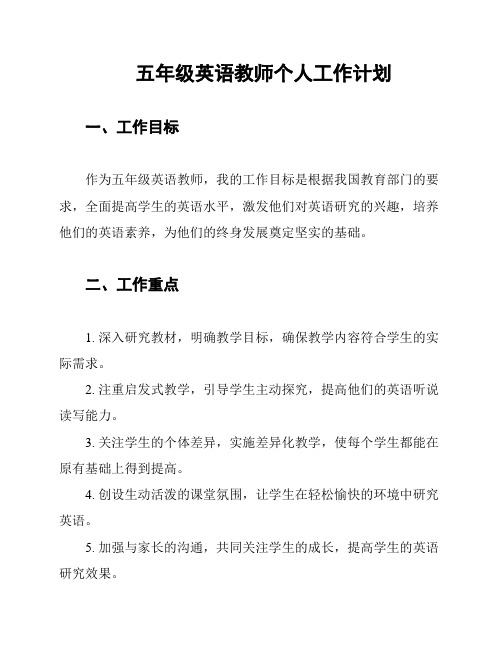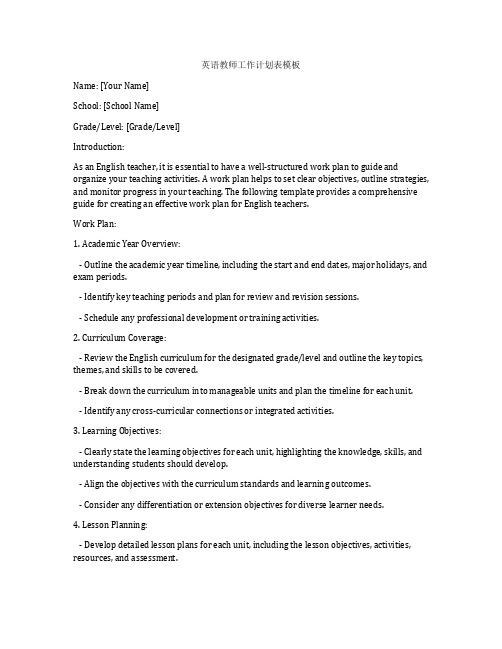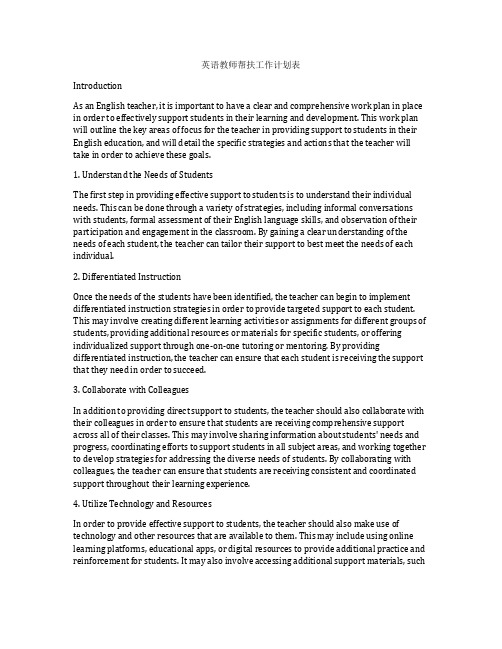英语教师工作计划表
五年级英语教师个人工作计划

五年级英语教师个人工作计划一、工作目标作为五年级英语教师,我的工作目标是根据我国教育部门的要求,全面提高学生的英语水平,激发他们对英语研究的兴趣,培养他们的英语素养,为他们的终身发展奠定坚实的基础。
二、工作重点1. 深入研究教材,明确教学目标,确保教学内容符合学生的实际需求。
2. 注重启发式教学,引导学生主动探究,提高他们的英语听说读写能力。
3. 关注学生的个体差异,实施差异化教学,使每个学生都能在原有基础上得到提高。
4. 创设生动活泼的课堂氛围,让学生在轻松愉快的环境中研究英语。
5. 加强与家长的沟通,共同关注学生的成长,提高学生的英语研究效果。
三、工作措施1. 制定详细的教学计划,明确每个学期的教学内容、教学目标和教学方法。
2. 认真备课,精心设计课堂活动,提高课堂教学质量。
3. 定期进行自我评估,发现教学中存在的问题,及时调整教学策略。
4. 参加教研活动,研究先进的教学理念和方法,不断提高自身教学水平。
5. 关注学生的研究进度,及时了解他们的需求,调整教学计划。
6. 组织丰富多彩的英语课外活动,提高学生的英语实践能力。
7. 定期进行家访,了解学生的研究情况,与家长共同关注学生的成长。
四、工作时间表1. 每周制定教学计划,备课时间为2-3小时。
2. 每周进行一次自我评估,时间为1小时。
3. 每月参加一次教研活动,时间为2-4小时。
4. 每学期组织一次英语课外活动,时间为2-4小时。
5. 每学期进行一次家访,时间为1-2小时。
五、预期成果1. 学生的英语听说读写能力得到明显提高。
2. 学生对英语研究的兴趣得到激发,英语素养得到培养。
3. 家长对学生的英语研究情况表示满意,与教师的沟通更加顺畅。
4. 教师自身的教育教学水平得到提高,成为学生喜欢的优秀英语教师。
通过以上工作计划,我相信在本学期的教学工作中,我能够为学生的英语研究提供更好的指导,帮助他们取得优异的成绩,为他们的未来发展打下坚实的基础。
英语班主任教师日常工作计划

Introduction:As an English class teacher, it is essential to have a well-structured daily work plan to ensure effective teaching and learning. This plan aims to outline the key activities and responsibilities of an English class teacher on a daily basis.I. Morning Routine (8:00 AM - 9:00 AM)1. Arrive at school and prepare the classroom for the day's activities.2. Review the schedule and prepare necessary materials for the classes.3. Check attendance and greet students.4. Begin the day with a brief English speaking activity to warm up the students.II. Class Instruction (9:00 AM - 12:00 PM)1. Teach the assigned lessons according to the curriculum and teaching objectives.2. Utilize a variety of teaching methods, such as group discussions,role-playing, and interactive games to engage students.3. Monitor student participation and provide individualized attention to students who require extra help.4. Encourage students to speak English actively and correct their mistakes gently.5. Provide timely feedback to students on their progress and areas for improvement.6. Administer quizzes and tests to assess student understanding of the material.7. Prepare for the next class by reviewing the lesson plan and preparing necessary materials.III. Lunch Break (12:00 PM - 1:00 PM)1. Take a short break to relax and recharge.2. Check and respond to emails, communicate with colleagues, and planfor the next day's lessons.IV. Afternoon Classes (1:00 PM - 4:00 PM)1. Continue teaching the assigned lessons, ensuring that the students are engaged and understanding the material.2. Conduct grammar and vocabulary exercises to reinforce learning.3. Prepare students for upcoming exams and tests by providing revision materials and conducting practice sessions.4. Provide individualized tutoring to students who require additional support.5. Monitor student behavior and address any discipline issues promptly.6. Collaborate with other teachers to plan interdisciplinary projects or activities.V. Office Hours (4:00 PM - 5:00 PM)1. Meet with students who have questions or need assistance with their studies.2. Attend department meetings or professional development workshops.3. Prepare and grade assignments, quizzes, and tests.4. Plan and prepare lessons for the following day.5. Communicate with parents or guardians regarding student progress and any concerns.VI. Evening Routine (5:00 PM - 6:00 PM)1. Review the day's accomplishments and reflect on areas that require improvement.2. Plan for the next day's classes, including lesson objectives, teaching methods, and necessary materials.3. Take a short break to relax and unwind before going home.Conclusion:This daily work plan for an English class teacher helps to ensure that the teacher is organized, efficient, and effective in their teaching duties. By following this plan, the teacher can create a conducive learning environment, foster student engagement, and promote academic success.。
英语教师工作计划表模板

英语教师工作计划表模板Name: [Your Name]School: [School Name]Grade/Level: [Grade/Level]Introduction:As an English teacher, it is essential to have a well-structured work plan to guide and organize your teaching activities. A work plan helps to set clear objectives, outline strategies, and monitor progress in your teaching. The following template provides a comprehensive guide for creating an effective work plan for English teachers.Work Plan:1. Academic Year Overview:- Outline the academic year timeline, including the start and end dates, major holidays, and exam periods.- Identify key teaching periods and plan for review and revision sessions.- Schedule any professional development or training activities.2. Curriculum Coverage:- Review the English curriculum for the designated grade/level and outline the key topics, themes, and skills to be covered.- Break down the curriculum into manageable units and plan the timeline for each unit.- Identify any cross-curricular connections or integrated activities.3. Learning Objectives:- Clearly state the learning objectives for each unit, highlighting the knowledge, skills, and understanding students should develop.- Align the objectives with the curriculum standards and learning outcomes.- Consider any differentiation or extension objectives for diverse learner needs.4. Lesson Planning:- Develop detailed lesson plans for each unit, including the lesson objectives, activities, resources, and assessment.- Incorporate a variety of teaching strategies, such as direct instruction, group work, and multimedia resources.- Consider opportunities for formative assessment and feedback.5. Assessment and Evaluation:- Create a plan for ongoing assessment, including quizzes, tests, projects, and presentations.- Outline the assessment criteria and rubrics for each assessment task.- Schedule regular feedback and review sessions to monitor student progress.6. Differentiation and Inclusion:- Identify strategies to accommodate diverse learner needs, including English language learners, students with special educational needs, and gifted students.- Plan for flexible grouping, scaffolded tasks, and differentiated resources.- Collaborate with learning support staff and other professionals to provide additional support as needed.7. Classroom Management and Discipline:- Establish clear rules and expectations for student behavior and participation.- Develop a plan for managing classroom routines, transitions, and potential disruptions. - Consider strategies for promoting a positive and inclusive classroom environment.8. Parent and Community Engagement:- Outline opportunities for parent involvement, including open houses, parent-teacher meetings, and volunteer opportunities.- Communicate regularly with parents through newsletters, emails, and other channels. - Identify community resources and partnerships to support English learning outside the classroom.9. Professional Development:- Identify areas for professional growth and development, such as new teaching strategies, technology integration, or subject knowledge.- Plan to attend relevant workshops, conferences, or courses to enhance your teaching practice.- Reflect on your teaching and seek feedback from colleagues and mentors.10. Self-Care and Wellbeing:- Schedule time for personal wellness and self-care activities to maintain a healthy work-life balance.- Identify strategies for managing stress and avoiding burnout.- Seek support from colleagues, mentors, or professional counseling if needed. Conclusion:Creating a comprehensive work plan is essential for effective teaching in an English classroom. This template provides a structured framework for planning and organizing your teaching activities. By following this work plan, English teachers can ensure clear objectives, cohesive lesson plans, and ongoing assessment to support student learning and achievement.。
英语组教研工作计划表

英语组教研工作计划表English: The English department's research and teaching work plan for the upcoming academic year includes several key components. Firstly, we aim to enhance our curriculum by incorporating more authentic materials and real-life contexts to engage students in meaningful language learning experiences. This will involve creating new lesson plans, worksheets, and activities that cater to different learning styles and proficiency levels. Additionally, we plan to organize teacher training workshops and seminars to keep our faculty updated on the latest methodologies and technologies in language teaching. Furthermore, we will focus on improving our assessment and feedback mechanisms to provide more personalized and constructive guidance to students. Lastly, we will continue to collaborate with other departments and institutions to exchange best practices and promote interdisciplinary learning opportunities. Overall, our goal is to create a dynamic and student-centered learning environment that fosters language proficiency, critical thinking skills, and intercultural competency among our learners.中文翻译: 英语组在即将到来的学年中的研究和教学工作计划包括几个关键组成部分。
校园英语教师的工作计划

校园英语教师的工作计划引言校园英语教师是一个非常重要的职位,他们肩负着培养学生英语能力,提高学生语言表达能力的重任。
为了更好地完成工作任务,校园英语教师需要制定合理的工作计划,并且根据计划有条不紊地执行。
本文将介绍校园英语教师的工作计划,内容包括每日工作安排、每周工作安排以及每月工作安排。
每日工作安排在每天的工作中,校园英语教师需要安排各类教学活动,包括课堂教学、备课等。
具体每日工作安排如下:1.早晨备课:每天早上校园英语教师需要提前一个小时进行备课,包括准备教案、准备教具等。
这样可以确保教师在课堂上的授课内容清晰、有条理。
2.课堂教学:校园英语教师根据每个班级的课程表进行上课,根据学生的英语水平差异,安排适当的教学内容和教学方法。
要注重培养学生的英语听、说、读、写能力,激发学生的学习兴趣。
3.课后批改作业:校园英语教师需要及时批改学生的英语作业,给予适当的评价和建议。
批改作业不仅可以帮助学生及时发现自己的问题,也可以为下一阶段的教学提供参考。
4.教师会议:校园英语教师需要参加学校组织的教师会议,与其他教师交流教学经验,共同提高教学质量。
5.个人学习和提高:校园英语教师可以利用下班后的时间进行个人学习和提高,例如阅读专业书籍、参加英语培训班等。
每周工作安排每周工作安排主要包括课程设计、活动策划等方面。
具体每周工作安排如下:1.课程设计:校园英语教师需要每周为自己的课程进行设计,包括教学目标、教学内容、教学方法等。
根据学生的需要和英语教学大纲,设计具有针对性和实用性的教学方案。
2.活动策划:校园英语教师可以根据学校的活动安排,策划相关的英语活动。
例如英语角、英语竞赛等,以提高学生的英语交流能力和学习兴趣。
3.预习和准备:校园英语教师可以利用周末的时间预习下周的教学内容,并准备相关教学资料和教具。
这样可以为下周的教学工作打下良好的基础。
4.学生评价:每周校园英语教师需要对学生进行评价,包括评分、评语等。
英语教师帮扶工作计划表

英语教师帮扶工作计划表
1. 了解学生情况
- 通过学生自我介绍、问卷调查等方式了解学生的基本情况和学习习惯
- 与班主任、家长沟通,了解学生的家庭背景和学习情况
2. 制定个性化学习计划
- 根据学生的基本情况和学习需求,制定个性化的学习计划- 与学生进行面对面沟通,讨论学习目标和方法,制定可行的学习计划
3. 辅导学生课外学习
- 组织课外学习小组,进行学习技巧和方法的指导
- 提供学习资源和辅导,帮助学生解决学习中遇到的问题
4. 鼓励学生参加英语活动
- 推荐学生参加英语角、辩论赛、英语报告等活动,提高语言实践能力
- 组织英语俱乐部或读书会,增强学生对英语学习的兴趣和热情
5. 定期跟踪学生学习情况
- 定期与学生进行学习情况的跟踪,及时发现问题并进行调整- 与班主任、家长进行沟通,共同关注学生的学习进展和问题解决
6. 总结帮扶工作经验
- 定期对帮扶工作进行总结,发现问题并改进工作方法
- 与其他英语教师交流工作经验,共同提高帮扶工作的质量和效果。
英语教学工作计划表5篇

英语教学工作计划表5篇最新英语教学工作计划表1在新课程理论的指导下,以学校教导处工作计划为指导,加强课堂教学,高效地完本钱学科教学目标,初三上学期英语教学工作计划。
积极参加教科研活动,努力使教学水平、业务能力有更大的提高。
同时,通过传授与学生生活紧密联系的英语知识,训练英语的听说能力,培养学生学习英语的兴趣和初步能力,最终使学生从“学会英语”,向“会用英语”。
为此,特制定本学期工作计划如下:一、学生情况分析初三(5)(6)班共有学生68人,学生的英语根底知识和听说能力普遍较差,大局部学生应用能力十分薄弱,特别是听力题,很大一局部学生听起来都很吃力。
二、本学期教育教学具体工作:教师是学生学习的推动者,学习能力的培养者,更是学生人生的引路人。
教师的任务是教书育人,但不能只做一个“教书匠”,更要做个“教育者”,要充分了解每个学生各个时期的心理状态并进行及时适度的处理,让他们的综合素养得到全面开展。
1、课前预备:备好课。
每一次备课都很认真,遇到没有把握讲好的课时马上提出,请其它英语老师参谋,综合考虑各种方案。
多发表自己的见解让大家讨论,如有问题马上更正、改良。
2.多听课,学习有经验教师的教学方法,教学水平的提高在于努力学习、积存经验,不在于教学时间的长短,在四中我虽然是一位老教师,但还需向有丰富教学经验的教师学习,尽量多深入课堂听课,不断提高自身的教学水平,听课的同时,认真做好记录,并进行评课。
听完课后写听课心得,哪些地方是自己不具备的,哪些地方可以怎样讲可能有更好的效果等等。
务求每听一节课都要有最大的收获,必要时,还可与讲课教师进行讨论,以了解其讲课安排的依据。
3.钻研教材,认真备课。
认真钻研教材,把握住知识点,认真备好每一堂课。
教材是教学的依据,同时也是学生学习的主要参考书,在熟悉教材的根底上讲授本课程的内容,学生学习才会有依据,学生在课堂上跟不上老师时可以参考教材重新整理思路,跟上老师的思路,所以应该重视教材的钻研。
英语教师帮扶工作计划表

英语教师帮扶工作计划表IntroductionAs an English teacher, it is important to have a clear and comprehensive work plan in place in order to effectively support students in their learning and development. This work plan will outline the key areas of focus for the teacher in providing support to students in their English education, and will detail the specific strategies and actions that the teacher will take in order to achieve these goals.1. Understand the Needs of StudentsThe first step in providing effective support to students is to understand their individual needs. This can be done through a variety of strategies, including informal conversations with students, formal assessment of their English language skills, and observation of their participation and engagement in the classroom. By gaining a clear understanding of the needs of each student, the teacher can tailor their support to best meet the needs of each individual.2. Differentiated InstructionOnce the needs of the students have been identified, the teacher can begin to implement differentiated instruction strategies in order to provide targeted support to each student. This may involve creating different learning activities or assignments for different groups of students, providing additional resources or materials for specific students, or offering individualized support through one-on-one tutoring or mentoring. By providing differentiated instruction, the teacher can ensure that each student is receiving the support that they need in order to succeed.3. Collaborate with ColleaguesIn addition to providing direct support to students, the teacher should also collaborate with their colleagues in order to ensure that students are receiving comprehensive support across all of their classes. This may involve sharing information about students' needs and progress, coordinating efforts to support students in all subject areas, and working together to develop strategies for addressing the diverse needs of students. By collaborating with colleagues, the teacher can ensure that students are receiving consistent and coordinated support throughout their learning experience.4. Utilize Technology and ResourcesIn order to provide effective support to students, the teacher should also make use of technology and other resources that are available to them. This may include using online learning platforms, educational apps, or digital resources to provide additional practice and reinforcement for students. It may also involve accessing additional support materials, suchas leveled reading books, grammar workbooks, or language learning software, in order to provide targeted support to students as needed.5. Provide Ongoing Feedback and AssessmentIn order to monitor the progress of students and provide ongoing support, the teacher should provide regular feedback and assessment to students. This may include regular quizzes, tests, or assignments that allow the teacher to track students' progress, as well as informal feedback and conversations that provide students with guidance and support as they work to improve their English skills. By providing ongoing feedback and assessment, the teacher can ensure that students are making progress and receiving the support that they need in order to succeed.6. Offer Additional Support and InterventionFor students who may require additional support or intervention, the teacher should be prepared to offer additional resources and assistance as needed. This may involve providing additional tutoring or mentoring, connecting students with support services or resources in the community, or working with the school's support staff to develop a plan for providing targeted support to students who require additional assistance. By offering additional support and intervention, the teacher can ensure that all students are receiving the support that they need in order to succeed.7. Reflect and AdjustFinally, the teacher should regularly reflect on their work with students and make adjustments to their support strategies as needed. This may involve reviewing student progress, soliciting feedback from students, colleagues, and parents, and identifying areas for improvement in their support strategies. By regularly reflecting and adjusting their support strategies, the teacher can ensure that they are providing the most effective support possible to students in their English education.ConclusionIn conclusion, this work plan outlines the key areas of focus for an English teacher in providing support to students in their English education. By understanding the needs of students, implementing differentiated instruction, collaborating with colleagues, utilizing technology and resources, providing ongoing feedback and assessment, offering additional support and intervention, and regularly reflecting and adjusting their support strategies, the teacher can ensure that all students are receiving the support that they need in order to succeed. With this comprehensive work plan in place, the teacher can be confident in their ability to effectively support students in their English education.。
- 1、下载文档前请自行甄别文档内容的完整性,平台不提供额外的编辑、内容补充、找答案等附加服务。
- 2、"仅部分预览"的文档,不可在线预览部分如存在完整性等问题,可反馈申请退款(可完整预览的文档不适用该条件!)。
- 3、如文档侵犯您的权益,请联系客服反馈,我们会尽快为您处理(人工客服工作时间:9:00-18:30)。
英语教师工作计划表
为了提高教学质量,新的学期,英语教师如何制定工作计划?下面是小编收集整理关于英语教师工作计划的资料,希望大家喜欢。
英语教师工作计划篇一
一、指导思想:
坚持“教书育人,为人师表”的教育宗旨,关心每一位学生的发展,爱岗敬业,以身作则。
使学生了解英语在当今社会的重要性,增强学生世界观和人生观,使学生初步形成健全合格的中的学生,做一个对社会有用的人。
二、学生情况分析:
我所教的本届七年级新生基础很差,由于在小学英语课并未受到足够的重视,学生在写的技能方面基本上没有得到过训练,连音标没讲过,甚至有一半的学生26个字母的拼读都没有掌握好。
经过上学期我和学生的不懈努力,他们的基础知识得到了加强,学习态度也有所好转。
部分学生有了主动学习的动力,但是
整体的惰性还是很强,我要积极主动的帮助他们重新建立学习兴趣。
另外,学生在学习策略方面还存在很多需要进一步体会掌握的地方。
很多学生不能明确学习英语的目的,没有真正认识到学习英语的目的在于交流;有些同学在学习中缺乏小组合作意识,不愿和其他学生交流,不能共同完成学习任务;大多数同学不能做好课前预习和课后复习,学习没有计划性,完全在老师的指挥棒之下学习,没能力做到总结语言规律和知识的巩固、积累。
这些都是我和学生要长期作战艰苦努力才能解决的问题。
我会慢慢给学生们信心去完成这些任务的,急是没有用的。
让学生们乐于接受我的教学指导,并找到自成体系的办法才是解决问题的关键。
三、教材分析:
本册书主要介绍了日常生活的交际用语以及一些西方国家的文化背景和风俗习惯,教材通俗易懂,旨在使七年级学生基本能用英语进行简单的交流。
本册书由两部分组成,即预备篇(3个单元)和正式篇(9个单元)。
本书除提供语言材料外,还配有大量插图和原声录音磁带。
四、教学目标:
通过努力,力求每一位学生能开口讲英语,能用英语进行简单的会话。
通过努力使大部分学生继续保持学英语的兴趣。
能保持浓厚的学习英语兴趣和积极主动参与实践,以点带面,力争达学校教学质量的要求。
五、教学措施和方法
措施:
1、培养学习兴趣,引导学生掌握正确的学习方法和策略,提高学习效率;
2、发挥学生主体和教师主导作用:
3、用良好的师生关系,协调课堂气氛,培养学生开口说英语的勇气和信心;
4、引导学生实现语言的迁移,加强日常生活中英语口语的运用;
5、鼓励学生自主探索,合用探究,共同提高。
6、加强听力训练。
方法:任务型教学:教师提出指令,学生规范操作。
听说领先,读写跟上。
综合训练,扎实双基。
六、教学进度:
第一周:StarterUnit1(Goodmorning!)
第二周:StarterUnit2(WhatsthisinEnglish?)
第三周:StarterUnit3(Whatcolorisit?)
第四周:Unit1(MynamesGina。
)
第五周:国庆节放假。
第六周:Unit2(Thisismysister。
)
第七周:Unit3(Isthisyourpencil?)
第八周:Reviewunit1-3
第九周:Unit4(Wheresmyschoolbag?)
第十周:Unit5(Doyouhavesoccerball?)
第十一周:复习前半学期所学内容,举行期中考试并进行总结分析。
第十二周:Unit6(Doyoulikebananas?)
第十三周:Unit7(Howmucharethesesocks?)
第十四周:ReviewUnit6-Unit7
第十五周:Unit8(Whenisyourbirthday?)
第十六周:Unit9(Myfavoritesubjectisscience。
)
第十七周:ReviewUnit8-Unit9
第十八-十九周:复习本册书内容。
第二十周:举行期末考试,进行总结,写好试卷分析。
英语教师工作计划篇二
一、本学期的指导思想
以学校工作计划为指导思想,以培养学生自主学习和自主管理能力为主线,针对任教学生普遍英语底子差,基础薄的实际,坚持“夯实基础,狠抓双基,改进学法,激发兴趣,提高能力”的指导思想。
在本学期的英语教学中,要坚持以下理念的应用:
1、要面向全体学生,关注每个学生的情感,激发他们学习英语的兴趣,帮助他们建立学习的成就感和自信心,使他们在学习过程中发展综合语言运用能力,提高人文素养,增强实践能力,培养创新精神;
2、突出学生主体,尊重个体差异,让学生在老师的指导下构建知识,提高技能,磨练意志,活跃思维,展现个性,发展心智和拓展视野;
3、让学生在使用英语中学习英语,让学生成为GoodUser
而不仅仅是Learner。
让英语成为学生学习生活中最实用的工具而非累赘,让他们在使用和学习英语的过程中,体味到轻松和成
功的快乐。
高二英语既注重基础知识的考查,又强调能力的灵活运用。
为了适应这一趋势,提高高二英语的教学质量,在高二英语教学中我将常抓基础知识,有梯度地拓宽词汇,提高课堂效率,从而努力提高学生学习的自觉性、主动性与积极性,通过师生互动,更进一步提高英语成绩。
二、学生情况分析
本学期本人任高一(6、10)班,从学生初中毕业考试成绩以及这阶段的观察来看,存在以下三方面问题:①在思想上、态度上放松或放弃的现象有所表露,读,不会读,就谈不上听得懂,看得懂,从而导致破罐子破摔的现象。
②基础知识不够扎实,灵活运用语言的技能相对薄弱。
③运用能力不够强实。
学生的阅读能力、理解能力、分析能力、判断能力、应变能力等均不能较好地适应考查要求。
语言学习的关键在于语言知识的积累,只有通过学习者亲身的体验和摸索,才能学会并掌握语言知识,从而达到在交际中灵活使用语言的目的。
三、教材简析
该册教材从不同方面具有如下特点:
1、内容丰富,涉及面广。
本册教材的课文篇幅长、题材广,内容丰富,不但是一个综合知识的大熔炉,而且时代气息逼人,很具有挑战性。
学生不但可以学到真实的英语语言,而且可以学
到广泛的综合知识,训练全面的英语语言技能。
说句实在话这套新教材对我们英语任课教师无论从语言知识而是语言技能上都
展开了挑战。
2、词汇量大,语言地道。
由于所选*涉及的领域多,又是原汁原味,因此,各方面的词汇都出现了。
又由于沿用地道的原文,不同作者用词不同,出现了大量的近义词。
虽然这给学生提供了学习英语的真实语言环境,但也增加了学生学习英语的难度。
3、精心编排,形式新颖。
教材编排的匠心不但体现在课文内容的精心选编和课型的优化设计。
特别突出的是教材的各种练习形式新颖别致,不但注重知识性,而且充分注入了趣味性。
也充分发挥了现代教育技术在英语学习中的先进作用。
4、理念先进,实践标准。
该册教材把综合语言运用能力的形成建立在语言技能、语言知识、情感态度、学习策略和文化意识等素养整合发展的基础上。
也把语言技能的形成作为语言学习的必须手段。
完全实践了《普通高中英语课程标准》的新理念。
四、本学期的教学目标及措施
高一年级是高中的重要阶段,是学生夯实基础的阶段。
因此,让学生在高一年级打好学科基础并有所发展是极其重要的。
下列目标应在本学期内达到:巩固、扩大基础知识;培养口头和书面初步运用英语进行交际的能力,侧重培养阅读能力;发展智力,。
